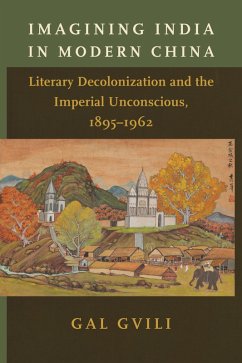Winner, 2023 Harry Levin Prize, American Comparative Literature Association
Beginning in the late Qing era, Chinese writers and intellectuals looked to India in search of new literary possibilities and anticolonial solidarity. In their view, India and China shared both an illustrious past of cultural and religious exchange and a present experience of colonial aggression. These writers imagined India as an alternative to Western imperialism-a Pan-Asian ideal that could help chart an escape route from colonialism and its brutal grasp on body and mind by ushering in a new kind of modernity in Asian terms.
Gal Gvili examines how Chinese writers' image of India shaped the making of a new literature and spurred efforts to achieve literary decolonization. She argues that multifaceted visions of Sino-Indian connections empowered Chinese literary figures to resist Western imperialism and its legacies through novel forms and genres. However, Gvili demonstrates, the Global North and its authority mediated Chinese visions of Sino-Indian pasts and futures. Often reading Indian literature and thought through English translations, Chinese writers struggled to break free from deeply ingrained imperialist knowledge structures.
Imagining India in Modern China traces one of the earliest South-South literary imaginaries: the hopes it inspired, the literary rejuvenation it launched, and the shadow of the North that inescapably haunted it. By unearthing Chinese writers' endeavors to decolonize literature and thought as well as the indelible marks that imperialism left on their minds, it offers new perspective on the possibilities and limitations of anticolonial movements and South-South solidarity.
Beginning in the late Qing era, Chinese writers and intellectuals looked to India in search of new literary possibilities and anticolonial solidarity. In their view, India and China shared both an illustrious past of cultural and religious exchange and a present experience of colonial aggression. These writers imagined India as an alternative to Western imperialism-a Pan-Asian ideal that could help chart an escape route from colonialism and its brutal grasp on body and mind by ushering in a new kind of modernity in Asian terms.
Gal Gvili examines how Chinese writers' image of India shaped the making of a new literature and spurred efforts to achieve literary decolonization. She argues that multifaceted visions of Sino-Indian connections empowered Chinese literary figures to resist Western imperialism and its legacies through novel forms and genres. However, Gvili demonstrates, the Global North and its authority mediated Chinese visions of Sino-Indian pasts and futures. Often reading Indian literature and thought through English translations, Chinese writers struggled to break free from deeply ingrained imperialist knowledge structures.
Imagining India in Modern China traces one of the earliest South-South literary imaginaries: the hopes it inspired, the literary rejuvenation it launched, and the shadow of the North that inescapably haunted it. By unearthing Chinese writers' endeavors to decolonize literature and thought as well as the indelible marks that imperialism left on their minds, it offers new perspective on the possibilities and limitations of anticolonial movements and South-South solidarity.
Dieser Download kann aus rechtlichen Gründen nur mit Rechnungsadresse in A, D ausgeliefert werden.


